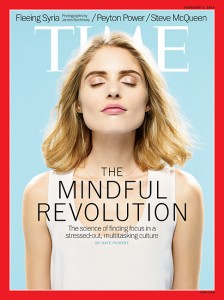 You might have seen the recent cover story on “The Mindfulness Revolution” in Time magazine. It gives a nice introduction to the practice as well as why it can be so helpful. Mindfulness is simply being in the present moment non-judgmentally. I’ve blogged about mindfulness countless times over the years. Here’s a blog about what mindfulness is and another about self-liberation through mindfulness.
You might have seen the recent cover story on “The Mindfulness Revolution” in Time magazine. It gives a nice introduction to the practice as well as why it can be so helpful. Mindfulness is simply being in the present moment non-judgmentally. I’ve blogged about mindfulness countless times over the years. Here’s a blog about what mindfulness is and another about self-liberation through mindfulness.
The Benefits of Mindfulness
A recent article in the Monitor on Psychology of the American Psychological Association reviews the research findings on the benefits of mindfulness. There are plenty! Mindfulness benefits include, and are not limited to, the following:
- Stress reduction
- Reduces rumination (i.e., negative thought loops)
- Improves focus
- Boosts working memory
- Lessens emotional reactivity
- Increases relationship satisfaction
- Increases cognitive flexibility
- Improves immune system functioning
- Improves well-being
Why is Mindfulness the Master Key?
When it comes down to it, mindfulness is really just about learning to focus our attention. Here is why mindfulness is the “master” key to change:
- Any efforts to change, to grow, to improve, require focused attention. Focused attention is fundamental to the change process. As Einstein said, “A problem cannot be solved by the same level of thinking that created it.” We must think and act in different ways in order to change. This requires us to focus our attention. If we don’t, then we are bound to go down the same old paths!
- Much of our suffering in life comes from our minds wandering to negative thoughts about ourselves, the world, the past, the future. Research shows that mind wandering tends to make us feel more negative – especially if we are already predisposed to depression and anxiety. The antidote for that is engagement, which again requires focused attention.
- When we are engaged in life, we tend to be happy. We can’t experience the wondrous things that are around us if we are lost in our thoughts. These are days…you’ll remember.
- Perhaps most importantly, our social relationships are central to our well-being. Although this is hard to pin down, by some estimates by researchers, approximately 70% of our happiness in life comes from our relationships. When we are in healthy, need-satisifying relationships, we tend to be happy. We feel bullied, lonely, alienated, isolated, or are in conflict, we tend to be unhappy. We can’t connect with others and nurture these relationships if we aren’t attentive to them. As a metaphor, what would happen to your garden if you weren’t being attentive to it? That’s right – not good! In the same sense, for our relationships to thrive, we must be attentive to them.
In essence, mindfulness is just a way for us to practice focusing our attention. Simply put, anything we accomplish in life requires focused attention – the better the focus, the more we can do. Since, in many respects, the brain is like a muscle, our brains get better at sustaining attention the more we practice doing so. With all of the texting, emailing, push notifications, and social networking from our endless tech devices, we need to practice focusing attention now more than ever!
I’m going to do several more blogs on this topic – so stay tuned!

Brilliant article as always, Mindfulness is the way to go!